How to explain endometriosis pain to a guy? (Updated 14th Oct 2024)
Many women ask themselves this question because we (men) speak an entirely different language and do not think in the same way women do. We don’t even experience pain in the same way, and despite these ongoing “wokey theories”, we DO NOT have wombs, period. Trying to figure out how to explain endometriosis pain to a guy can be difficult, but here’s what I’ve learned from speaking to countless women who suffer from this brutal chronic condition:
Endometriosis pain isn’t isolated to reproductive organs, it spreads beyond the pelvis. This pain feels like the insides are being pulled apart, it can feel sharp and stabbing, and severely impacts women’s life bringing limitations to daily activities, work, and intimacy.
While doing my work I found plenty of women trying to spread endometriosis awareness via video content, but one of them stood out the most. Cécile runs a small charity called “endOF” and asked my wife to appear in her wonderful video. It is very touching!
As I update this post, I took another day off work to support my wife in her struggles. Today, she’s very emotional, I also noticed, she self-harmed this morning.
I understand that not every husband is willing to give up a few days of work to do that, but it really pays off! Your partner gains a lot, you just skip a day of work.
Why guys need to be explain endometriosis pain?
Well, let me tell you, gentlemen, it’s about time you open your minds and show some empathy towards the women in your lives who suffer from this excruciating condition.
Endometriosis is not just a fancy word or an abstract concept; it is a debilitating reality that affects countless women worldwide. And guess what?
You need to understand it! First off, let’s get one thing straight: Men have no wombs and thus no endometriosis.
However, just because you don’t experience the physical agony of endometrial pain doesn’t mean you can dismiss it as insignificant. By taking the time to comprehend what these women go through, you are showing respect and support for their struggles.
To truly grasp the magnitude of endometriosis pain, imagine having chronic pain that feels like your insides are being twisted and stabbed repeatedly. Imagine waking up in the middle of the night crying out in agony because your body is betraying you once again.
This torment is a daily reality for many women with endometriosis. Now, I know what some of you may be thinking: “But how can we understand something we’ve never experienced?” Fair point!
But don’t worry; I’m here to guide you through the process of explaining this complex issue to someone who does not suffer from endo pain. Let’s start with analogies.
Think of endometriosis as a tiny army invading a woman’s body, setting up camp where they shouldn’t be – on organs like her ovaries, fallopian tubes, or even her intestines. These little soldiers create havoc within her reproductive system, causing severe inflammation and intense pain.
Imagine if this army decided to invade your own precious manly fortress – let’s say your stomach or colon – and set up camp there without permission! You’d feel pretty damn distressed too!
Well, my friends, that’s what endometriosis does to women. It infiltrates their bodies like unwelcome guests and wreaks havoc on their well-being.
So, gentlemen, it’s time to set aside any preconceived notions or discomfort you may have when it comes to discussing women’s health issues openly. Educate yourselves about endometriosis symptoms and pain so you can support the women in your lives properly.
Empathy goes a long way in building stronger relationships and fostering a more compassionate society. Understanding endometriosis pain is not just about acquiring knowledge; it’s about demonstrating empathy and solidarity.
It’s about being there for the women who endure this silent struggle day in and day out. So, let’s step up, guys!
Let’s show our support by learning about endometriosis-related pain and advocating for better healthcare options for all those affected by this condition. Together we can make a difference.
Together we can create a world where no woman feels alone or misunderstood because of her endo pain.
Are you with me?
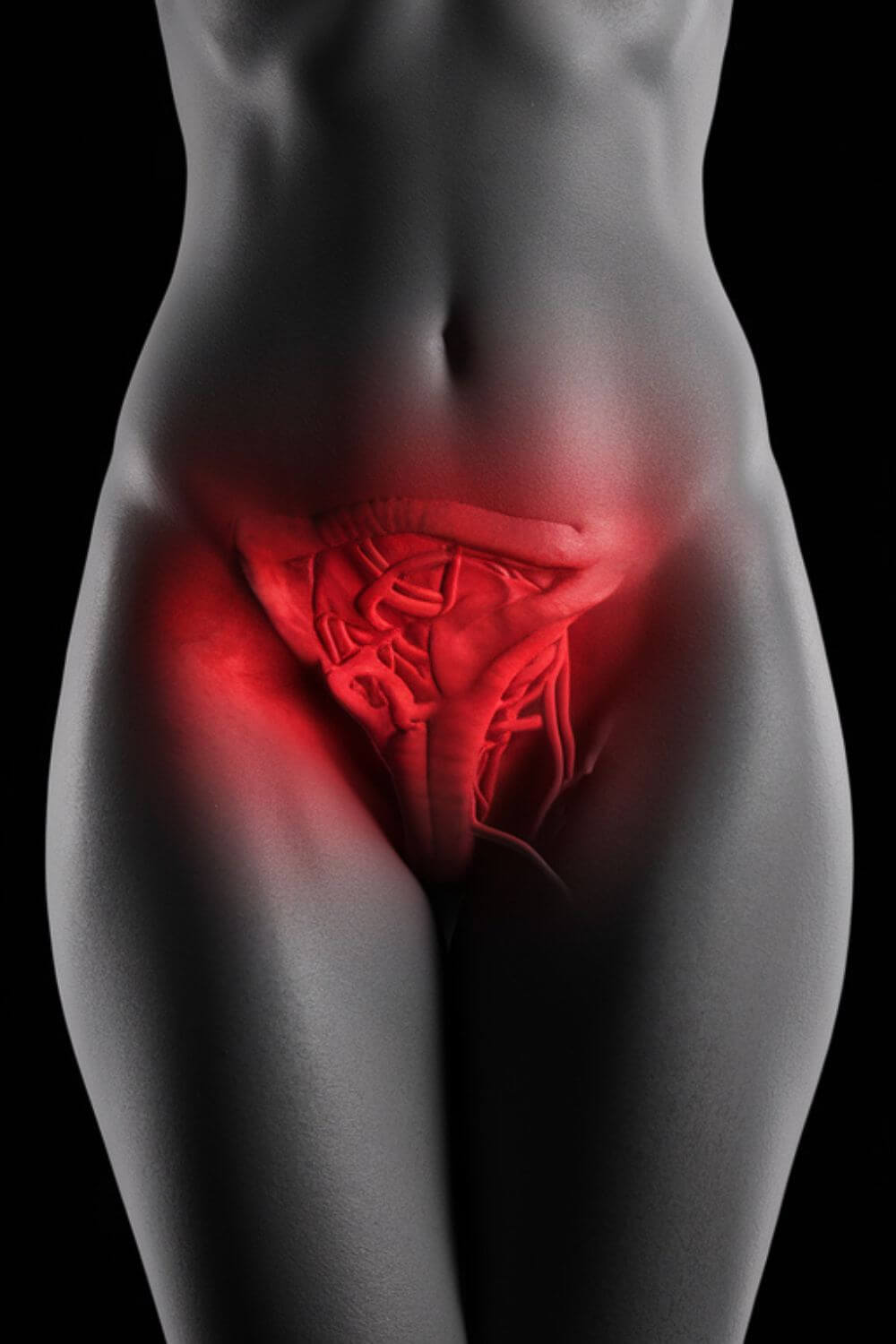
How to explain endometriosis pain to someone?
Explaining endometriosis pain to someone who does not suffer from it can be a daunting task. How can you possibly convey the excruciating, debilitating, and relentless nature of endo pain to someone who has never experienced it?
It’s like trying to describe the taste of chocolate to someone who has never indulged in its velvety sweetness. Nevertheless, it is essential that we make the effort to educate others about this silent struggle that affects millions of women worldwide.
Comprehending endometriosis pain requires stepping outside the boundaries of one’s own physical experience and embracing empathy. Imagine if your insides were being repeatedly stabbed with a thousand tiny knives, each twist and turn causing waves of agony to ripple through your body.
This is what endo pain feels like for many women. It’s not just a fleeting sensation; it’s a constant presence that hovers over their lives like a dark cloud.
To explain endometriosis pain effectively, we must emphasize its chronic nature. Imagine waking up every single day with an invisible force squeezing your abdomen, making even the simplest tasks feel like monumental challenges.
Activities as mundane as sitting at a desk or going for a walk become battles against intense discomfort and fatigue. For those suffering from endometriosis-related pain, there is no escape; it follows them relentlessly day in and day out.
Another aspect worth highlighting is the unpredictability of endo pain. One moment you may be feeling fine, going about your daily routine, and then suddenly, without warning or logical explanation, the pain strikes with an unyielding force that leaves you breathless.
Describing this unpredictable nature can help others grasp the unpredictability that accompanies living with chronic pain. Furthermore, it’s essential to convey how endo pain extends beyond physical discomfort alone—it infiltrates every aspect of life.
The emotional toll cannot be understated: feelings of frustration, sadness, anger, and helplessness often accompany the physical anguish. Relationships suffer, careers are impacted, and even the simplest joys of life can be overshadowed by the persistent presence of pain.
Ultimately, explaining endometriosis pain to someone who does not experience it requires an open mind and a willingness to listen. It is crucial to create a safe space for conversation where women with endometriosis can share their experiences openly and honestly.
Educating others about the realities of living with endo pain is essential for fostering empathy and support within our society. Understanding endometriosis pain is a complex task that demands empathy, imagination, and an open heart.
By emphasizing its chronic nature, unpredictability, emotional toll, and impact on daily life, we can help bridge the gap between those who suffer from endometriosis-related pain and those who do not. It is only through education and compassion that we can create a world where women with endometriosis feel seen, heard, supported, and ultimately find relief from their silent struggle.
Men have no wombs therefore have no endometriosis.
Men have no wombs, therefore they cannot experience the excruciating agony of endometriosis. It is a simple biological fact that men do not possess the reproductive organs that are plagued by this insidious condition. They will never know the searing pain that accompanies every menstrual cycle or the constant discomfort of living with endometriosis-related symptoms.
Yet, as much as we would like to believe that men can empathize and understand, it is an uphill battle trying to explain endometriosis pain to someone who does not suffer from it. Endometriosis pain is unlike anything else.
It is not a mere inconvenience or discomfort; it is a relentless torment that grips your entire being. Imagine having knives repeatedly stabbed into your abdomen while someone twists them mercilessly.
That level of agony may come close to experiencing what some women with endo pain endure on a daily basis. It’s not an exaggeration; it’s their reality.
One might argue that comparing endometriosis pain to something like appendicitis or kidney stones would help convey its severity to men. While those conditions undoubtedly cause tremendous suffering, they are acute and finite episodes of agony.
Endo pain, on the other hand, extends far beyond these isolated incidents; it infiltrates every aspect of a woman’s life on a chronic basis. To truly comprehend endometriosis pain, one must understand the complex nature of this condition and how it ravages the female reproductive system.
Endometrial tissue grows outside the uterus—on ovaries, fallopian tubes, bladder—invading organs and causing intense inflammation and scarring. This results in debilitating pelvic pain throughout various stages of the menstrual cycle.
The invisibility of this disease adds another layer of frustration when explaining endometriosis pain to men who cannot directly relate. Unlike external wounds or physical disabilities, this chronic internal affliction remains hidden from prying eyes.
Women with endometriosis often appear perfectly fine on the surface, while they struggle beneath an invisible shroud of torment. Men may argue that they too experience pain, which is undoubtedly true.
However, it is important to recognize that men and women have different pain thresholds and perceptions due to biological and hormonal variations. It is not a matter of competition or comparison; it is a biological reality.
Therefore, when we attempt to explain endometriosis pain to men, it’s vital for them to recognize the unique experiences women with this condition endure. It is challenging and sometimes disheartening to explain endometriosis pain to someone who has never experienced it firsthand.
The absence of personal understanding can be frustrating, leading some women with endo pain feeling dismissed or invalidated. However, by approaching the topic with empathy and education, we can bridge this gap in comprehension between genders and foster a greater understanding of the debilitating nature of endometriosis pain.
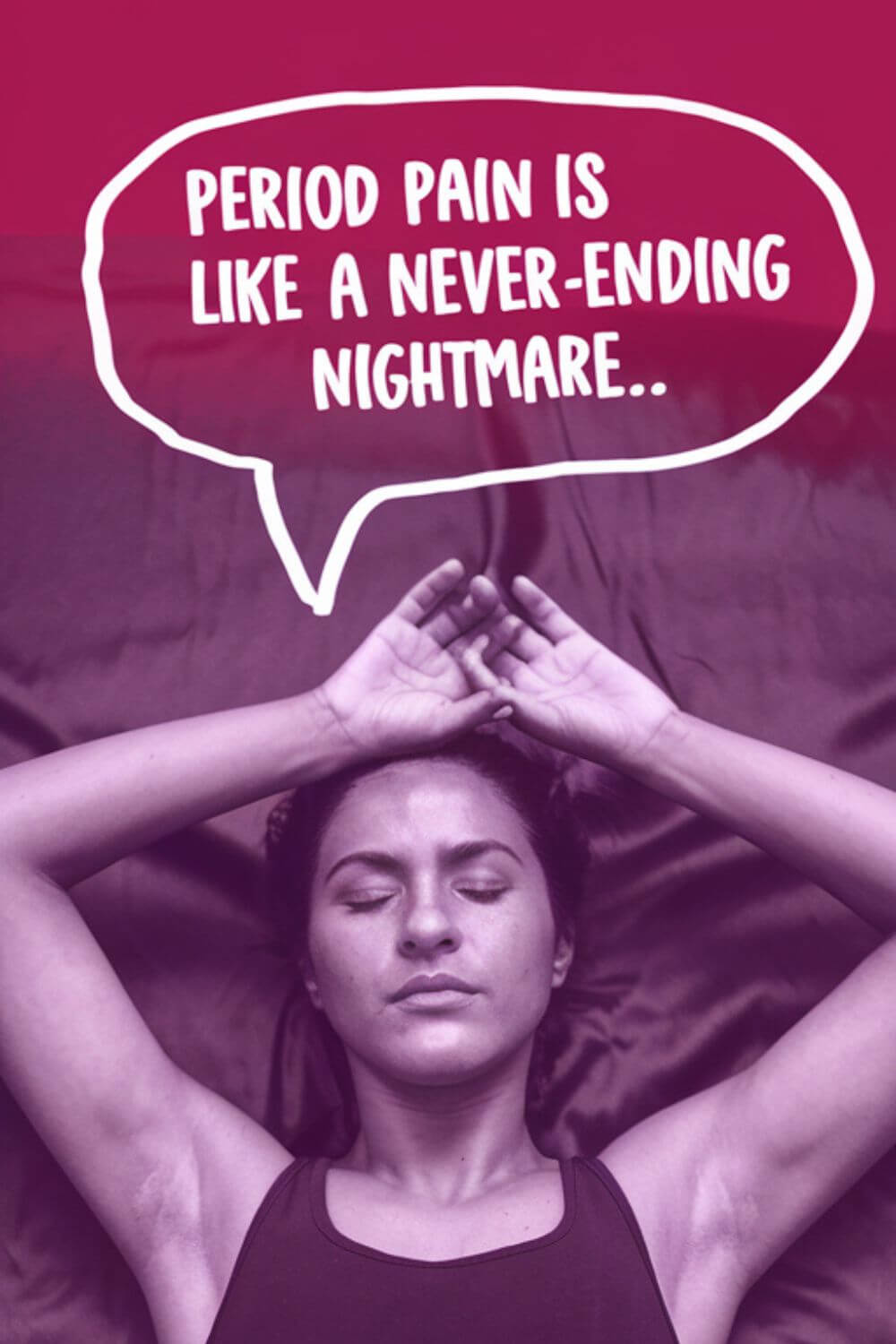
Different types of endometriosis pain.
When it comes to endometriosis pain, there is no one-size-fits-all experience. The vast array of symptoms that accompany this debilitating condition can make it challenging to explain the sheer magnitude of the pain to someone who does not suffer from it.
Nonetheless, understanding the different types of endometriosis pain is crucial in conveying just how excruciating and life-altering this condition can be. One of the most common forms of endometriosis-related pain is menstrual cramping.
However, let’s not downplay these cramps as mere discomfort; they are far from ordinary period pains. Endometriosis-related menstrual cramps can resemble labor pains, causing incapacitating agony that makes everyday tasks seem impossible.
The throbbing, stabbing sensations rip through a woman’s lower abdomen like a relentless storm, leaving her unable to function normally. Another type of endometrial pain experienced by women with endometriosis is referred to as chronic pelvic pain.
This type of agony is not limited solely to menstruation; rather, it lingers throughout the month like an unwelcome guest overstaying their welcome. It manifests as a constant dull ache that never truly disappears, reminding women each day of their body’s betrayal.
Adhesions and scar tissue are also common manifestations of endometriosis and can contribute significantly to the overall pain experienced by sufferers. These abnormal tissue growths occur when misplaced endometrial cells attach themselves to organs and tissues outside the uterus.
As they develop and spread throughout the pelvic region, they create a web-like network that tightens around vital structures like an invisible vice grip, causing sharp, shooting pains with every movement. Deep dyspareunia or painful intercourse is yet another type of torment inflicted upon those with endometriosis.
Engaging in sexual activity becomes an excruciating ordeal rather than an intimate pleasure for these individuals. The deep penetration required during intercourse aggravates inflamed endometrial tissue, leading to searing pain that can persist for hours or even days afterward.
Last but certainly not least, we must address the emotional toll that accompanies endo pain. The constant battle with unrelenting agony, coupled with the frustration of a condition that is often misunderstood and misdiagnosed, takes a profound toll on a woman’s mental well-being.
Anxiety, depression, and feelings of isolation become frequent companions for those who endure this relentless pain day in and day out. Capturing the essence of endometriosis pain is no easy feat.
Describing these different types of agony is merely scratching the surface of what it truly feels like to live with this condition. However, by shedding light on the various forms this pain takes – from debilitating cramps to chronic pelvic agony – we hope to foster understanding and empathy in those who have yet to comprehend the daily struggle faced by women with endometriosis.
The similarities between endometriosis and cancer!
Let me begin by delving into the striking similarities between endometriosis and cancer. It is an unfortunate truth that both these conditions cause immense suffering and bear a heavy burden on those who experience them. While they may differ in their underlying causes, the pain they inflict upon individuals is alarmingly similar.
Just as cancer spreads its insidious roots throughout the body, endometriosis infiltrates and engulfs a woman’s reproductive system, leaving no crevice untouched. Endometriosis pain, much like cancer-related pain, can be relentless and unyielding.
Those who battle this condition understand all too well what it means to endure chronic pain on a daily basis. The nagging ache that accompanies every movement becomes an unwelcome companion, a constant reminder of the battle being fought within their bodies.
This persistent pain is not to be taken lightly or dismissed as trivial; it has the power to dictate lives and cripple even the strongest of individuals. Yet, despite these glaring parallels between endometriosis and cancer-related pain, there remains a stark difference in how society perceives them.
Cancer has long been recognized as a serious illness that demands compassion and understanding from those around us. Supportive communities rally together to offer comfort and assistance to those afflicted by this merciless disease.
Meanwhile, endometriosis often languishes in the shadows of misunderstanding and ignorance. It is crucial for men to comprehend this parallel between endometriosis pain and cancer-related suffering because it is through this understanding that empathy can flourish.
Though men do not personally experience endo pain themselves, acknowledging its similarity to the agony caused by such a life-threatening illness can pave the way for more compassionate conversations. To explain endometriosis pain to someone who does not suffer from it requires shifting their perspective towards recognizing its gravity – likening it to the torment experienced by those fighting against formidable adversaries such as cancer.
By employing analogies that highlight the shared experiences of pain and suffering, we can bridge the gap between comprehension and empathy. However, this understanding must not stop at mere recognition.
It is essential to acknowledge that while endometriosis may not be life-threatening like cancer, it still significantly impacts a woman’s quality of life. The debilitating symptoms, the countless doctor’s visits, and the relentless pursuit of relief all warrant genuine concern and support from those who seek to truly understand the plight of their loved ones.
Drawing parallels between endometriosis pain and cancer-related suffering is essential in our quest to explain this often-misunderstood condition to men. By highlighting their similarities – the chronicity, intensity, and impact on daily life – we can create a foundation for empathetic conversations.
It is time for society to recognize and validate the immense challenges faced by individuals grappling with endometriosis-related pain. Only through understanding can we hope to provide solace and support to those fighting this battle each day.
How to explain endometriosis pain to a guy infographic.
Below, you will find the “how to explain endometriosis pain to a guy” infographic. You can download it for FREE!
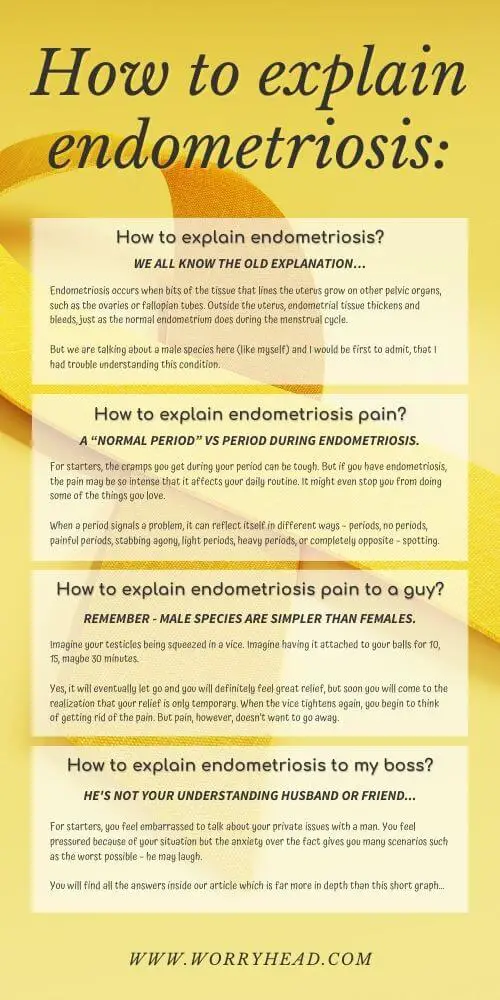
Why men feel pain differently than women?
Let’s face it, folks.
Men and women are just wired differently when it comes to experiencing pain. Now, before you jump down my throat accusing me of perpetuating harmful stereotypes, hear me out.
I’m not saying that men are tougher or that women are weak. I’m simply stating a well-known fact backed by scientific research.
When it comes to the realm of pain, women have been dealt a pretty lousy hand thanks to endometriosis. The excruciating cramps, the stabbing sensations, the relentless chronic pain – it’s enough to bring even the strongest among us to our knees.
And yet, here we are trying to explain this agony to someone who has never experienced anything remotely similar. Here’s the thing: men and women have different hormonal compositions and nerve endings.
It’s not rocket science; it’s biology 101. Men don’t possess a uterus with endometrial tissue that wreaks havoc on their bodies every month like clockwork.
They don’t have a menstrual cycle with all its joys (and by joys, I mean indescribable agony) such as bloating, fatigue, and mood swings. To put it bluntly – men simply do not have the physical capacity to understand endometriosis pain fully.
It’s like asking someone who has never tasted chocolate what it feels like when you take a bite of heaven wrapped in cocoa goodness – an impossible task! No matter how eloquent our words may be or how vividly we describe each twinge of agony we endure month after month, they will never truly grasp what we go through.
Now let me be clear – this is not an attempt to undermine or belittle anyone’s pain experience. Men can suffer greatly from their own unique set of issues such as kidney stones or sports injuries (which most likely they will dramatically exaggerate while conveniently forgetting about childbirth).
However, the point here is that comparing these experiences to endometriosis pain is like comparing a paper cut to an amputation. So, my fellow endo warriors, while it may be frustrating and exhausting trying to explain our pain to someone who cannot comprehend it fully, let’s remember that empathy can go a long way.
We need to have those conversations with the men in our lives, not expecting them to fully understand but rather seeking their understanding and support. Because at the end of the day, even if they can’t feel our pain in their bones, they can still offer love and compassion.
Ladies (and gentlemen who happen to be reading this), we must come to terms with the fact that men simply do not feel pain in the same way we do when it comes to endometriosis. It doesn’t make them heartless or uncaring; it’s just a biological difference.
So let us educate and inform them as best we can without harboring unrealistic expectations. And above all else, let’s support one another through our shared struggle because nobody understands endo pain like another warrior in the trenches.
What makes explaining endometriosis pain to a guy so difficult?
Learning how to explain endo pain to a guy feels like communicating in a completely different language. Women with endometriosis look healthy from a man’s perspective, even when they’re fighting a lot of symptoms of pain at the time.
Endometriosis is invisible to a guy, it is an invisible illness, and as we all know very well, guys are visual creatures.
Guys can’t experience endometriosis pain, this is why it’s hard for men to make a connection. The same situation applies to describing the pain of childbirth. Guys also don’t suffer from bad or severe period pain either, we don’t have menstruation.
I’ve heard a million times the medical explanation of endometriosis, and I am sure you have to…
Endometriosis occurs when bits of tissue similar to the one that lines the uterus grows in other areas, including other pelvic organs, such as the ovaries or fallopian tubes. Outside the uterus, endometrial tissue thickens and bleeds, just as the normal endometrium does during the menstrual cycle.
As a man, the last thing I want is to hear medical jargon, I want a simple explanation. Men can’t even spell the word “endometriosis”, let alone understand it.
In the beginning, I had trouble understanding my wife’s condition. Today I know how to explain endometriosis pain to a guy, after all, I’m one, and I know how I wish to be explained.
I decided to write this step-by-step guide listing a number of questions to which you will find answers in each part. These questions are:
- How to explain endometriosis?
- How to explain endometriosis pain?
- How to explain endometriosis pain to a guy?
- How to explain endometriosis to my boss?
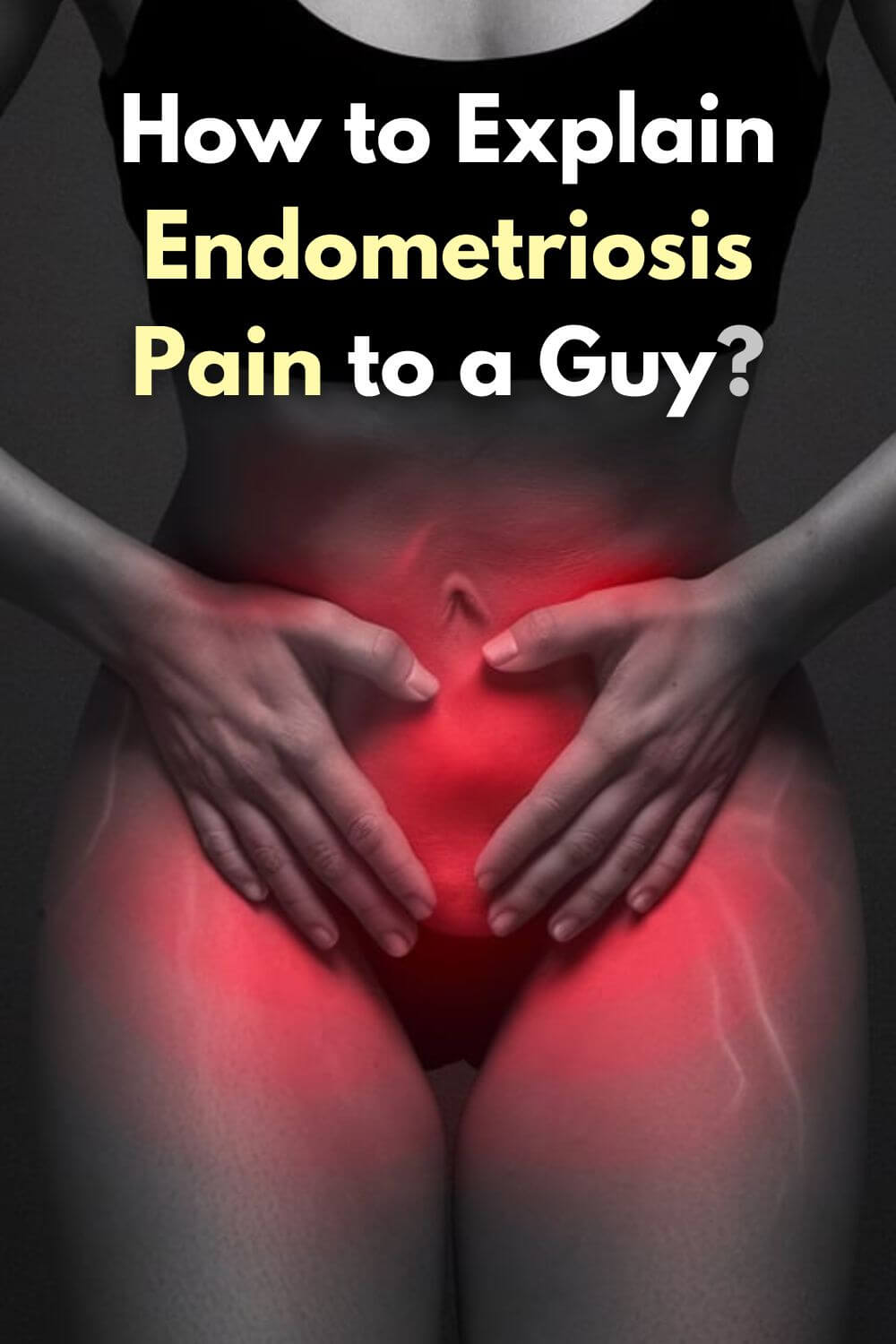
How to explain endometriosis?
Many times I heard my wife’s screams in agony, I saw her climbing the walls from the extreme pain, and the endless visits at A&E which always resulted in a lack of knowledge of doctors, their disbelief, and the stigma attached that it was all in her head.
Doctors can be very persuasive and they will always find a way to turn things around, and despite feeling unsatisfied, filled with anger and neglect, women are made to believe that period is meant to be painful, and in most cases, they hear things like “it is all anxiety and stress”.
At the time I knew absolutely nothing about endometriosis. The first thing I learned about it was that this chronic condition affects 10% of women around the world.
Statistics say that 1 in 10 women have endo, but this is only data from confirmed cases. When you take into account women who aren’t diagnosed, the real number is definitely higher.
Thinking of trying to answer how to explain endometriosis pain to a guy, I decided to compare endometriosis to cancer. I know it sounds really unfair to those who have cancer, but before you judge, hear me out…
As a paramedic, I’ve seen many kinds of cancer, and my family and friends also had it. I found many similarities between both these diseases.
Which one is worse, endometriosis or cancer? I thought about it many times, and here’s what I realized…
Cancer has an end-point to it. It’s either curable and people recover, or the person dies. In both cases, there is an end-point. When it comes to endometriosis:
- There is no cure, no relief, and no end.
- Endometriosis itself can evolve into endometrial cancer.
- Endometriosis spreads just like cancer.
- Endometriosis is as painful as cancer.
- Untreated affects multiple organs, it is also a whole-body disease.
- There is no chemotherapy for endometriosis.
- Regardless of repetitive surgeries, in most cases, endometriosis grows back.
- It lowers the quality of life, making women’s diets very restricted.
- Endometriosis gives a high risk of infertility.
- Gives gastric and hormonal problems.
- It erases sex life and intimacy, breaking many relationships.
- Affects not only a woman but those who love and support her.
Why do I compare endometriosis and cancer?
Because not many people may know that the cure for cancer exists! Doctor Stanisław Burzyński, discovered the cure a while ago. Here’s a short BBC clip, and the actual full documentary.
Okay then, why don’t we hear about it? Because of one of the biggest cover-ups in the history of medicine which the FDA will never admit.
Burzynski, a bright and pioneering biochemist discovered a unique method of successfully treating most cancers. The 50-year journey, both Dr. Burzynski and his patients, have been enduring in order to obtain FDA-approved clinical trials of Antineoplastons.
Antineoplastons cure cancer patients in a matter of a few months. They don’t give side effects or kill patients (like radiotherapy does).
Defying skepticism, legal attacks from state and federal agencies, and a powerful propaganda campaign to stop Burzynski, he refused to give up, curing many people.
But FDA was determined to put stop to this game-changing innovation because they never wanted his discovery to reach the open market.
The primary reason that the cancer industry and its regulatory agencies fear the approval of Antineoplastons is purely economical. The cure for cancer exists, but the cure for endometriosis doesn’t.
How to explain endometriosis pain?
Endometriosis pain can vary from day to day or night to night. Endometriosis symptoms and severity differ from woman to woman too. Pain can be difficult to describe.
It’s true that men won’t be able to understand entirely what endometriosis pain feels like and opening up the conversation about endo pain can be overwhelming, especially when it comes to sex.
So, if you don’t know where to start, I have some tips for you:
You are most likely going to be worried that he won’t understand you. I’m here to reassure you, that it’s okay to be worried, so plan things ahead. You know the condition yourself but planning what you’re going to say will help you make this conversation more successful.
The best way to describe any chronic condition is to understand it well so you can answer any questions he may have.
I know it may seem like an early stage, but it’s good to be prepared to talk about what your future might look like, for instance planning on having kids, and potential IVF, if endometriosis was to affect your fertility.
When you’re in pain, it can be easy for you to forget that your partner also goes through things trying to work out how to help you cope.
Like myself, he may also be juggling many of the same emotions. I personally felt sadness, loss, grief, guilt, anger, loneliness, and sometimes even resentment. Knowing that endometriosis is your common enemy makes you realize, that you are both in this together.
Wait until he has a good day, and he’s relaxed before you make time for the two of you to sit down and have a conversation.
I found in my marriage with an endometriosis wife that honest and open communication is most effective, but try to switch off the phone and the telly, and create a quiet environment free from distractions.
It may happen that your guy may struggle to understand it the very first time, so try again another time.
Tell him that endometriosis is a whole-body condition and that it can affect any part of the body. Paint him the full picture of pain and highlight the range of symptoms that affect your life, including fatigue, diet, emotions, and work.
Explain to your guy that endometriosis pain stops you from doing even the simplest tasks.
So, to wrap it up:
- Learn about endometriosis.
- Choose the right time to talk.
- Be patient with him.
- Remember, you can be supportive too.
- Don’t give up, try again…
If you want to learn more about endometriosis, I wrote an “Endo-Tool, Endometriosis for Men” e-Book of which you can get a FREE 1st chapter containing all you need to know about this chronic condition, plus how to cope and support your partner.
- What is endometriosis?
- What are the symptoms?
- What causes endometriosis?
- What does endometriosis look like?
- What are the stages?
- What are the types?
- What is adenomyosis and how is it related to endometriosis?
- Why do some women develop severe endo and others don’t?
- Does endometriosis cause infertility?
- How is endometriosis diagnosed?
- Do types and stages affect the treatment?
- Recurrence of endometriosis after excision surgery.
FREE Chapter of “Endo-Tool”!
an Endometriosis for Men book
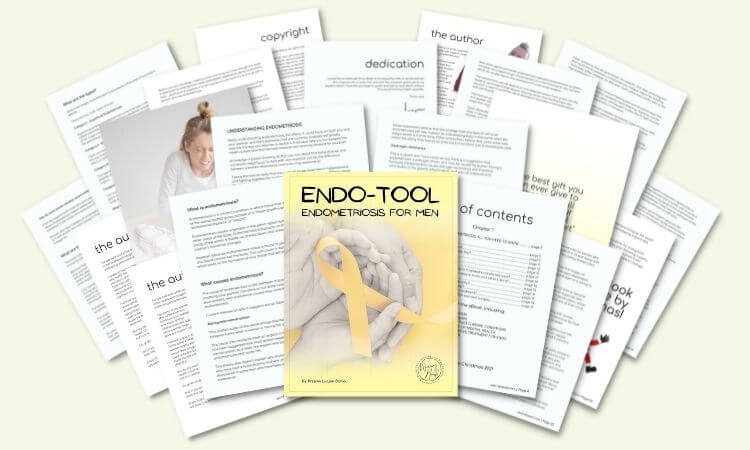
How to explain endometriosis pain to a guy?
I asked directly my wife, her mum, my sister, and my mum. I wanted to know the difference between a “normal period” and a period during endometriosis.
What I found was the fact that “normal period cramps” don’t compare to those women who suffer from endometriosis.
Aside from my wife, all the women said that they had moderate pain during their cycles. My wife, on the other hand, was in a lot of pain.
My wife had extremely painful periods and also painful ovulation, but none of the non-endo ladies went into the details of how it meant to feel because every woman is unique and has a different level of pain threshold.
The cramps women get during their period can be tough, but with endometriosis, the pain may be so intense that it affects your daily routine. It might even stop you from doing some of the things you love. For my wife, it is dancing.
What I’ve learned by talking to my wife is that endometriosis causes pain in more than one area of your body, including:
Pelvic or belly pain may start before the period and last for several days. It can feel stabbing and sharp, some women say it feels like their insides are being pulled down. My wife has very intense pains, driving her psychotic, wanting to cut herself open.
Backache. The uterus and ovaries are near the back and so belly pain radiates over hurting your back, too.
Leg pain. The nerves that connect to your groin, hips, and legs are also involved. Their pain can make it hard to walk. My wife limps or has to curl often.
Painful sex. It’s almost non-existent. Many women with endometriosis feel pain while having sex but despite the pain, they try to please their partners, ignoring their own well-being.
Painful bowel movements. Depending on the affected areas, it might hurt to poop or/and make you constipated.
All the above pains can be confusing, as 40% of women, including my wife, have fibromyalgia which causes widespread pain. This is why it’s difficult to know how to explain endometriosis pain to a guy, as it’s extremely complex.
How to explain endometriosis to your boss?
So here is another issue my wife had. Not only did she struggle with how to explain endometriosis pain and people who could not understand it, but she also didn’t know how to explain endometriosis to her boss.
Whatever your boss will decide to do, there are changes that might follow, you may be asking yourself more questions, which may impact your life, including:
- physical health
- psychological health
- mental health
- your relationship
- planning family
- work and social life
- financial situation
Before you begin to think about how to explain endometriosis to your boss, there will be an avalanche of questions popping into your head, so before the meeting with your boss, you need to get to know your options and your rights!
I have no idea how it is in other countries but I base this on my wife’s case, which took place in the United Kingdom.
Your sick pay. In the UK we have Statutory Sick Pay which is not paid at your normal rate of pay but at the SSP rate – £88.45 per week.
Seems laughable, right? Well, unfortunately, that’s real.
SSP is not paid for the first three days of sickness. Furthermore, it runs out after 28 weeks. Additionally, if you’re self-employed you are not entitled to this.
You must provide the self-certification form or a letter from your GP (let’s call it “a sick note”) in the case of your absence being 7 days or more. Self-certification forms are available in your GP surgery.
For women suffering from endometriosis, the reoccurring situation of not being paid for the first three days of their absence results in a great loss of money.
Longer-term sickness results in the statutory sick pay period of 28 weeks but after that period you are no longer able to receive this kind of pay from your employer. Don’t get alarmed – the government will take over in continuing to pay you, thanks to you paying money through your payroll.
Privacy. You are entitled to refuse any of the information about your health. You cannot be forced by your boss to agree to disclose your medical history.
Endometriosis is a very personal and feminine condition. You may feel frightened and refuse to talk to your male boss but also from the fear that your colleagues at work might hear you speak and you worry about what they might think or say.
My wife works from home these days but feels guilty, and says that work colleagues probably talk behind her back.
I try to reassure her that they have their own lives to worry about, I say that “people don’t think what you think, these are your thoughts. Besides, they aren’t your friends or family…”
Equality and Disability. This might be tricky to consider and I will be the first to admit, that my wife refuses to be seen as “disabled”. She’s fit, she’s a dancer and she doesn’t want to feel limited in any way.
I am pretty sure, this is the case for many of you lovely ladies.
Women suffering from endometriosis feel a physical or mental impairment that has a substantial, and long-term negative effect on their ability to carry out normal day-to-day tasks, and when it comes to a job, it may seem impossible.
In some cases, such as my wife’s, if you work with a computer, you have the option of working from home. Ask your employer for just that. Remember that you’re entitled to work within reasonable adjustments under the protection of the Equality Act since 2010.
None of you are going to lose on it and it might be a win-win solution. If you take zero days off, you are more efficient at work. Both parties win!
Occupational Health. My wife also reached for it. People often think that it isn’t in their right to reach out to OH, but actually, with my presence at the meeting with her boss, my wife did exactly that.
She told her boss to contact Occupational Health for her because contacting “Occy Health” is her employer’s duty.
As my wife found out firsthand, not all OH consultants are familiar with endometriosis, and it might be necessary for the various doctors to work together, and with your consent, collect the appropriate data to make recommendations.
Ordinary Flexible Working Request. You have the right to make flexible working requests but your boss is not obliged to grant them.
As I said, my wife asked to change her work location (home) and change her working hours like it was for the majority of people being able to work from home during the epidemic of Covid-19.
Remember that you don’t have to do everything yourself. If you have a helpful male in the family, use him so to speak. Have a man by your side!
Yep – this is where we step in guys – it really does miracles!
Having a man by her side the employer will not dare to dismiss or blindly blame endometriosis on stress and anxiety, not knowing what it is in the first place.
You are there to put your foot down if anything was to go along these lines! If needed, do it, be the man, and confirm what your wife is going through.
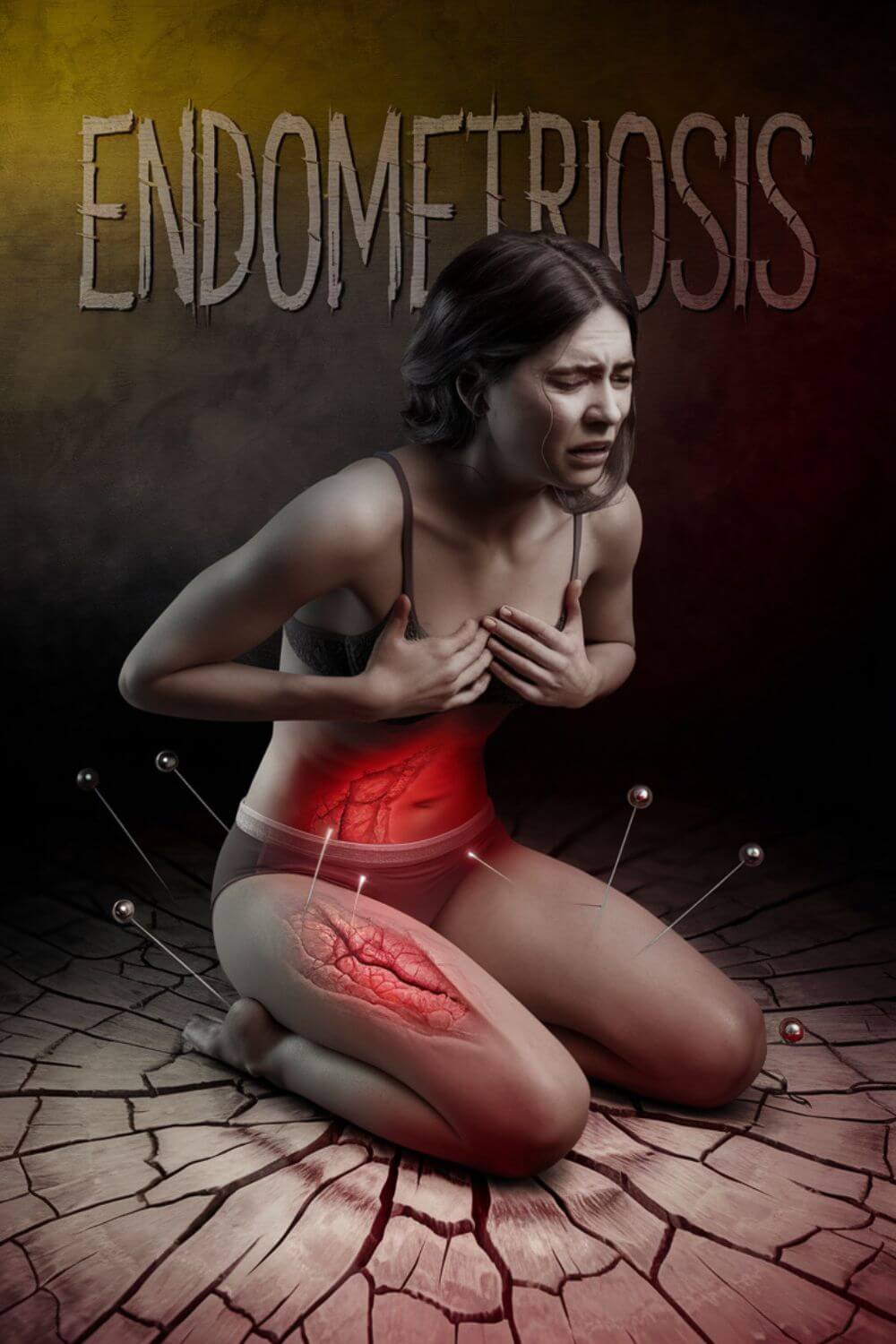
The complexity of endometriosis!
It gets even more confusing because when a period signals a problem, it can reflect itself in different ways – periods, no periods, painful periods, stabbing agony, light periods, heavy periods, or completely opposite – spotting.
As you probably learned back at school, menstruation is the monthly shedding of the female uterine lining.
It can be very uncomfortable and sometimes inconvenient because the period is the body’s way of saying that the reproductive system is working properly.
Every woman is unique and every woman’s period has its own personality, therefore it reflects the pain differently. Some are short, others are long. Some are heavy, others are light.
That adds up to the complexity of endo and makes it more difficult to answer how to explain endometriosis pain to a guy…
Is there such a thing as a normal period? The answer is no, not really.
The reason being is that the average woman’s menstrual cycle lasts about 28 days, and the average bleeding lasts for three to five days but periods can vary from woman to woman.
Every woman should be tracking her own menstrual cycle because it allows her to notice whether something is wrong or not.
The period can either:
- Slow down or stop.
- Get heavier than normal.
- Bleed between periods.
- Get extremely painful.
Many women have heavy bleeding and strong cramps when they have their period. It is known as “menorrhagia”. However, heavy periods are sometimes caused by other health problems.
Beyond that, they can lead to other health issues. If you soak through a pad or tampon every hour or so you need to consider that option and contact your doctor.
It is important because heavy bleeding, as was the case of my wife, causes anemia, which undoubtedly is going to leave you weak, fatigued, drained, and tired all the time.
My wife had to:
- Change pads at least once an hour or two for an entire day at a time.
- Change pads in the middle of the night.
- Wear pads at a time to manage the heavy flow.
Women may also:
- Skip things they love doing, due to painful cramps.
- Pass blood clots that are the size of quarters.
- Have periods that last longer than 7 days.
- Feel tired or short of breath.
- Bleed between periods.
- Bleed after menopause.
There are some common causes of period changes. These causes might be:
Hormone problems. Every month, a lining builds up inside the womb which needs to be shed during the period. If the hormone levels aren’t balanced, the body can make the lining too thick, which leads to heavy bleeding.
If then the ovulation (release of an egg from an ovary) won’t happen, this can throw off the hormone balance in the body and that leads to a thicker lining and a heavier period.
Growths in the womb. They can be in a form of polyps or fibroids, which are non-cancerous tumors that grow within the uterus. Both, too, can make periods much heavier or make them last longer than they should.
Certain IUDs. Some of them can definitely cause changes in the period and many women use them for birth control. If IUD doesn’t contain hormones, it may make periods heavier.
Female cancers. It’s pretty rare but cancer of the uterus, cervix, or ovaries may cause excess bleeding, which may appear to be a heavy period.
Pregnancy problems. An example here is an ectopic pregnancy. It’s also rare but it happens. After sperm and egg meet, the growing ball of cells. It may cause serious health problems and such as heavy bleeding.
Besides all the above there are bleeding disorders, which can occur in a family or certain medications such as blood thinners may also cause heavy periods.
So, there’s plenty to take into consideration when it comes to menstruation changes if you are looking for evidence of endometriosis pain.
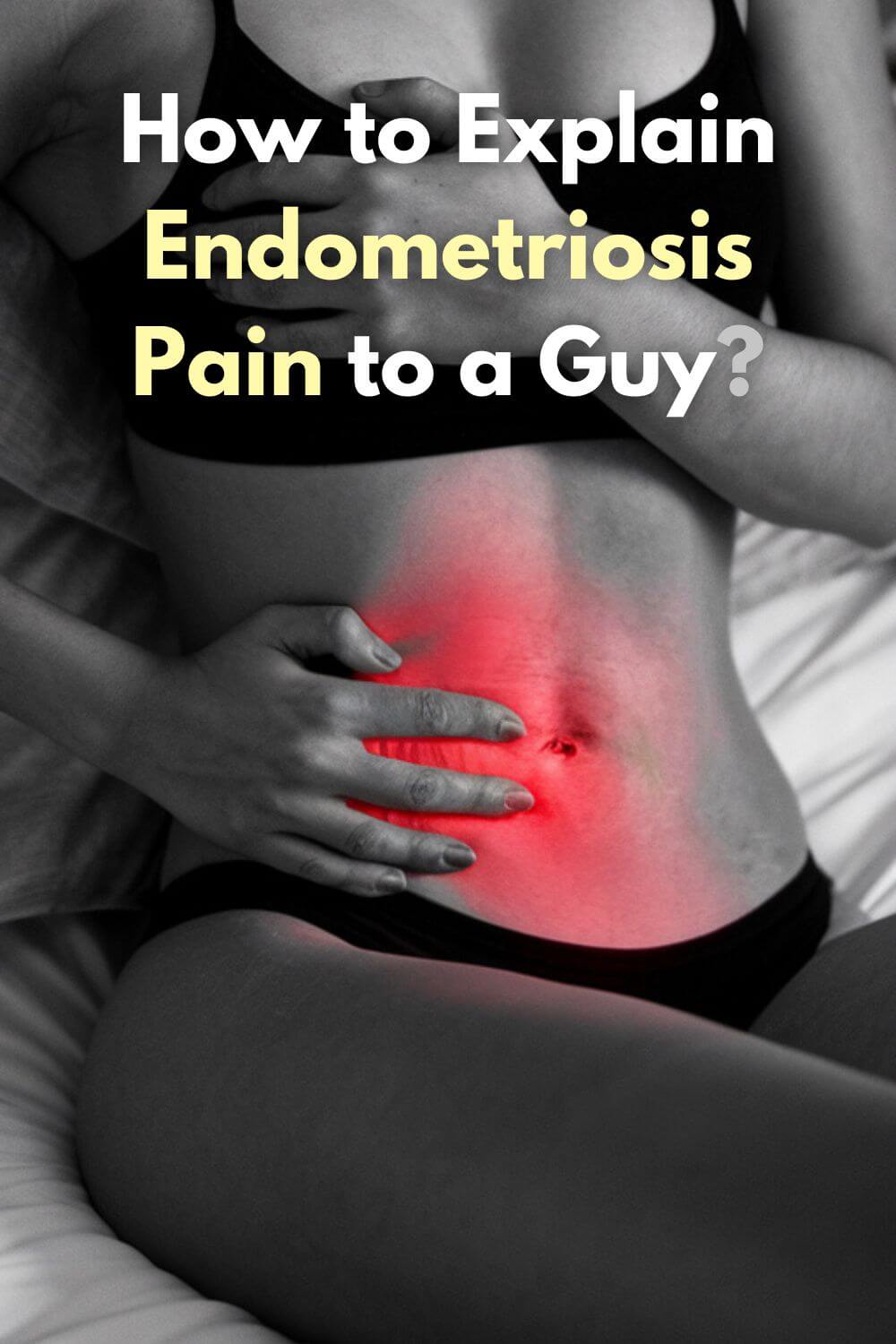
Conclusion on how to explain endometriosis pain to a guy.
THERE IS NO CURE. Regular surgery is needed to physically cut out the unruly tissue. After that, you literally can’t move for a week or more. Women truly deserve to be treated special. I believe that women’s life is more difficult than men’s.
Even the women who are healthy have more struggles than us in life, let alone women who suffer from endometriosis.
It is imperative that we bridge the knowledge gap between men and women when it comes to understanding endometriosis pain. Men may not have personal experience with this excruciating condition, but that should not deter them from empathizing with and supporting their female counterparts who suffer from it.
By taking the time to educate themselves about endometriosis and its symptoms, men can become allies in the fight against this silent epidemic. Explaining endometriosis pain to someone who does not suffer from it is no easy task.
It requires patience, compassion, and a willingness to listen and learn. It involves finding relatable metaphors or comparisons that can help convey the intensity of the pain experienced by those with endometriosis.
By using familiar reference points such as sports injuries or migraines, we can help men grasp just how debilitating endo pain can be. Chronic pain is a daily reality for many individuals with endometriosis.
Its unpredictable nature makes planning activities or commitments a constant challenge. Imagine living with pain so intense that it affects every aspect of your life – work, relationships, and personal well-being.
Endometriosis-related chronic pain is like being trapped in a prison of agony, without any guarantee of release. The symptoms of endometriosis go far beyond mere physical discomfort; they also take a toll on mental health and emotional well-being.
The constant battle with chronic pain can lead to anxiety, depression, and feelings of isolation. Women often face skepticism or disbelief when trying to explain their condition to others who cannot fathom how something unseen could cause such anguish.
However, there is hope for change on the horizon. As we continue raising awareness about endometriosis and combating misconceptions surrounding it, more men are becoming educated about this invisible enemy within our society’s womenfolk.
With increased empathy and understanding comes the power to support those struggling with endo pain. Let us strive for a society where the burden of explaining endometriosis pain to men becomes unnecessary.
Let us work towards a world where knowledge and compassion walk hand in hand, and where women with endometriosis no longer have to fight alone. By standing together, we can uplift and empower those affected by this debilitating condition.
I hope I managed to at least touch the subject and answer in basic terms how to explain endometriosis pain to a guy.
Let’s meet in the comments section below. We can help spread awareness of endometriosis, one of the most brutal chronic conditions.


About Me
Hi, I’m Lucjan! The reason why I decided to create this blog was my beautiful wife, who experienced a lot of pain in life, but also the lack of information about endometriosis and fibromyalgia for men…
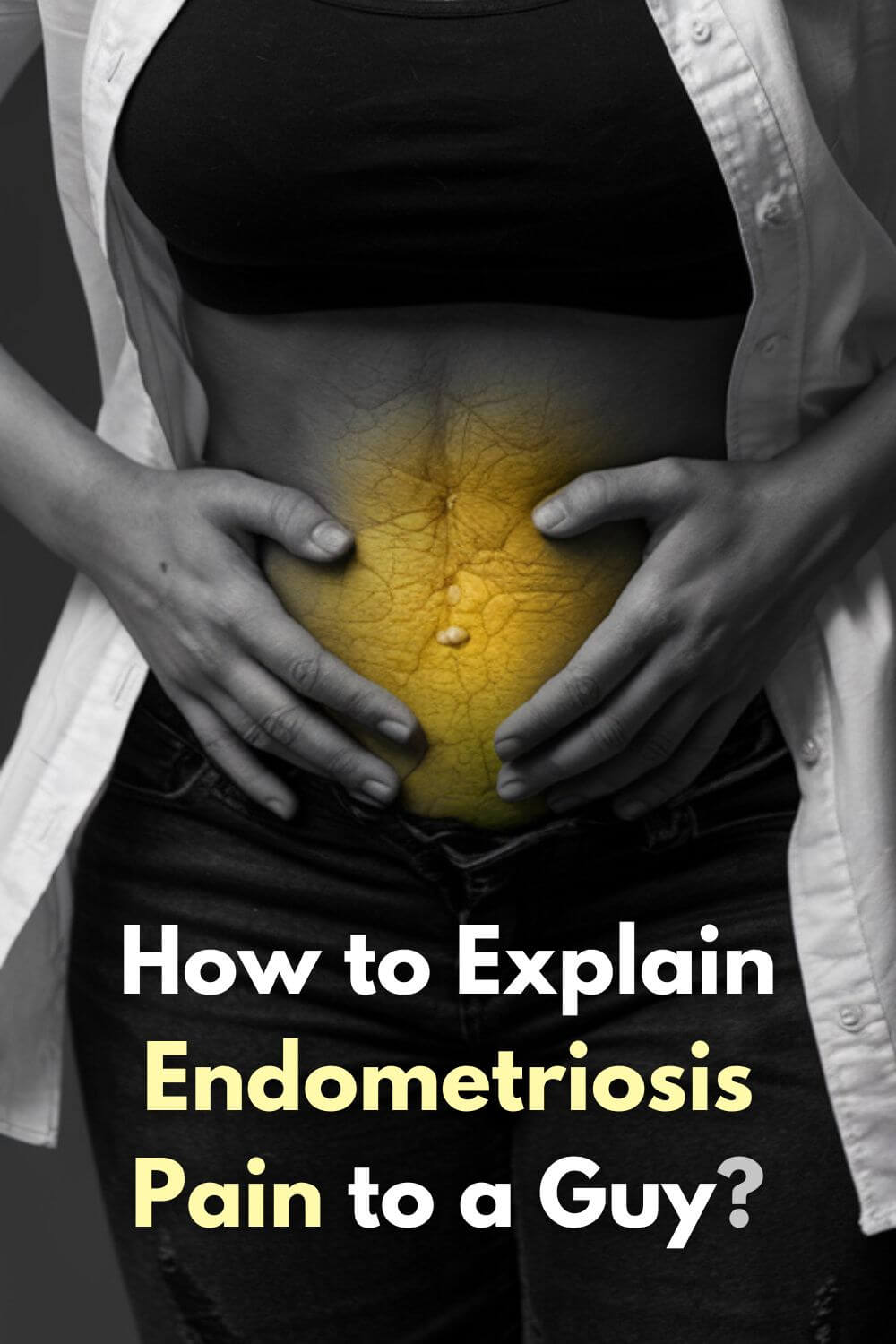
Best Lucjan,
My wife sends me this link to read, because we, just like you guys, went through the whole process of going from doctor to doctor and hear almost every “expert” opinion all these doctors have with regards to Endometrioses.
My wife is on the waiting list for her 5th operation now, but because of the Covid-19, she is not seen as a priority. Painkillers are not working anymore, and I wish I could change places to ease her burden. That is the powerless feeling any husband or partner has seeing his wife in this agony of severe pain.
It is a lengthy piece of text to read, but its full covers what I also try to explain to people if they ask me;” what is Endometrioses?” Sometimes I am not even going there anymore because people just do not understand, and it is hard to explain.
We are by the way Dutch, and in the Netherlands, there is only 1 specialized hospital that has extensive knowledge and experience with the condition and that hospital in in Amsterdam. For us, a 3-hour drive from home.
Just like your wife, my wife loves dancing (we did ballroom dancing on competition level), see loves horseback riding (she also does that on high competition level, and was gymnastics on national level when she was younger. So she also learned how to “eat” away the pain and not have this condition stand in her way, but when she is getting older and older it is harder to do. (she is now 37)
She also sometimes wanted to make the comparison with cancer, but as humble as she is, she never did that because she thought that cancer is considered much worse, until she read your blog. Basically, same for me. What we already thought, you put into words. Thanks for that. We feel not being alone in this anymore.
Nobody in our families understands this. They all think it is treatable and should be fine after an operation. They are every time again surprised if I tell them that my wife is going backwards again and soon need to be operated again. They do not understand.
I will send them this article and maybe it will be an eye opener for them. (I will first translate it into Dutch, so it is a bit easier to understand. (I work in Saudi, so I read, write, and talk English all day, so basically my second language now.)
I just wanted to thank you for this. I will share (did it already) with close friends and family in the hope of a little more understanding of this problem.
I wish you and your wife all the best and strength in the world. Just like you, I love my wife very much and I made a promise when I married her. We are all in this together, and no matter what, we will go through it together. That makes a good team.
Regards,
Gertjan (& Angelique)
Dear Gertjan & Angelique,
It is so lovely to hear from you guys. You are really kind and you made me realise that I’m on the right track to helping people or ar least letting them know that they are not alone.
I’m so sorry to hear that your wife has a 5th operation now. My M had only one but she was lucky enough to be operated on by one of the top specialists in London where we live.
However, she still suffers with pelvic pain and all-over, widespread body pain which has been diagnosed as Fibromyalgia.
The things that help her through is doing excersise, pilates and dancing but not too much. She uses CBD cream to help her pain but she doesn’t take any hormones because they cause her very bad mood swings and she already suffers from anxiety and depression. She doesn’t take painkillers aside from Paracetamol.
She’s 45. What helps her is psychotherapy CBT for anxiety because stress is the trigger for pain.
I am happy that you want to translate my post to Dutch. This is so nice.
Thank you both so much! I’m certain that she finds an angel in you, you sound like the best man for her. She’s lucky to have you. You’re doing fantastic job advocating for her.
Sending our love and support Gertjan & Angelique,
Lucjan & M.